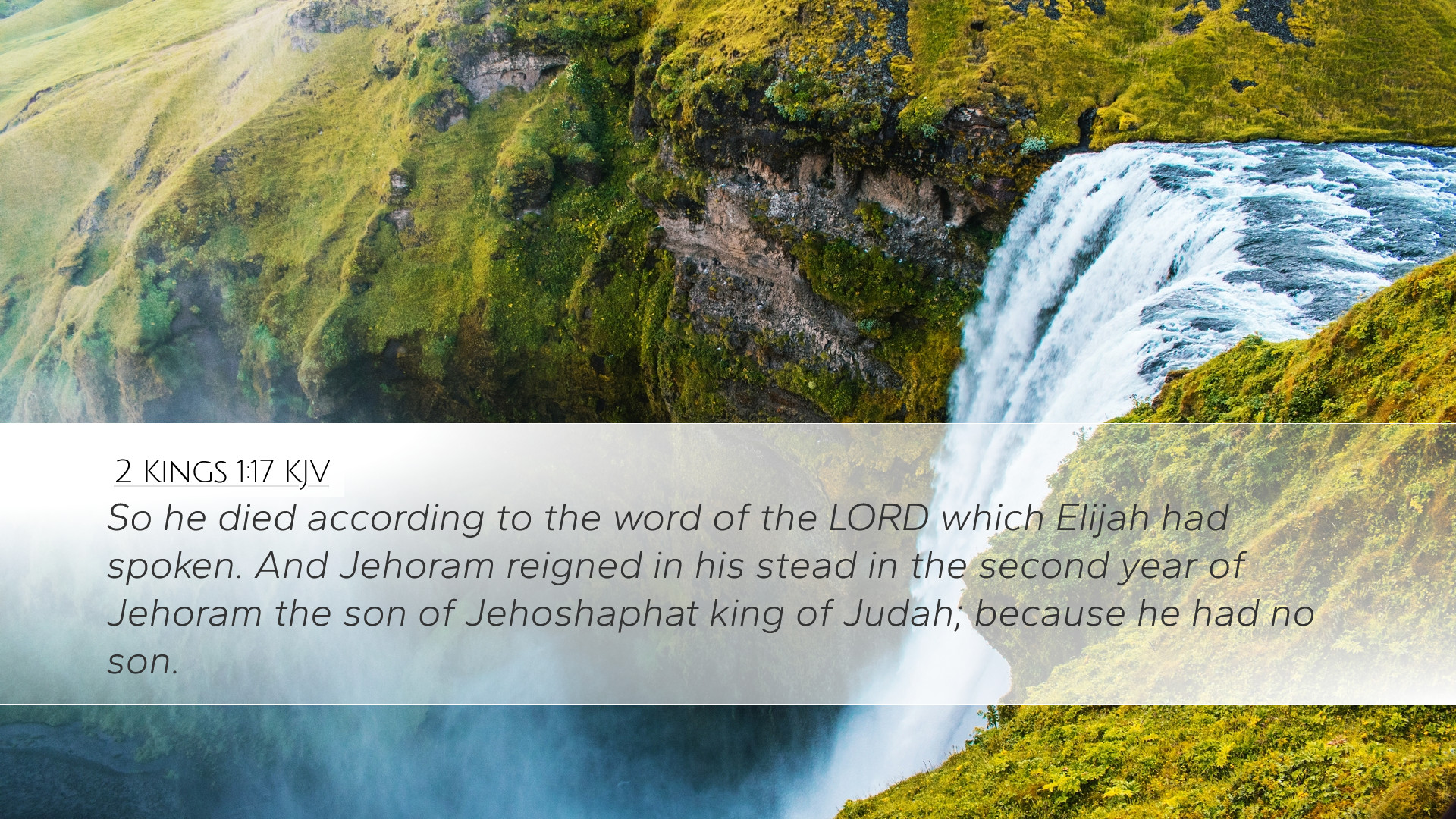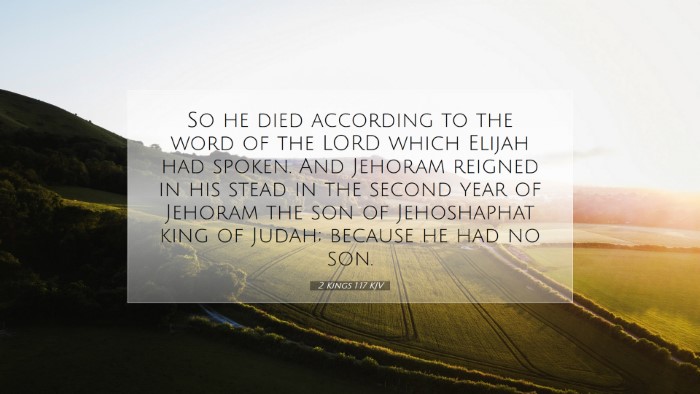Old Testament
Genesis Exodus Leviticus Numbers Deuteronomy Joshua Judges Ruth 1 Samuel 2 Samuel 1 Kings 2 Kings 1 Chronicles 2 Chronicles Ezra Nehemiah Esther Job Psalms Proverbs Ecclesiastes Song of Solomon Isaiah Jeremiah Lamentations Ezekiel Daniel Hosea Joel Amos Obadiah Jonah Micah Nahum Habakkuk Zephaniah Haggai Zechariah Malachi2 Kings 1:17
2 Kings 1:17 KJV
So he died according to the word of the LORD which Elijah had spoken. And Jehoram reigned in his stead in the second year of Jehoram the son of Jehoshaphat king of Judah; because he had no son.
2 Kings 1:17 Bible Commentary
Commentary on 2 Kings 1:17
Verse Context: 2 Kings 1:17 states, "So Ahaziah died according to the word of the Lord which Elijah had spoken. And Jehoram became king in his place, in the second year of Jehoram the son of Jehoshaphat, king of Judah; for Ahaziah had no son." This verse is a culmination of God’s judgment, prophetic authority, and the succession of kings in Israel.
Introduction
This commentary explores the implications of 2 Kings 1:17 through the insights provided by esteemed public domain scholars like Matthew Henry, Albert Barnes, and Adam Clarke. Each commentator offers a unique perspective that enriches our understanding of this pivotal moment in Israel's history and prophetic narrative.
Historical Context
Ahaziah, the king of Israel, exemplifies the tragic outcome of disobedience to God. His reign is marked by idolatry and reliance on false gods, particularly following the death of his father, Ahab. The context surrounding his illness and subsequent death portrays a direct correlation to his spiritual failings and the overarching themes of divine judgment.
Matthew Henry’s Insights
According to Matthew Henry, this verse underscores the certainty of prophecy. He emphasizes how the death of Ahaziah was not just a happenstance but a fulfillment of Elijah's prophecy. Henry notes that God's word is always fulfilled and that the divine judgment pronounced on Ahaziah had significant implications for Israel's spiritual climate.
Key Takeaways from Henry:
- Ahaziah’s demise serves as a warning against disobedience and idolatry.
- The prophecy from Elijah highlights the efficacy and power of God's word.
- Henry draws a parallel between Ahaziah's character and the sociopolitical conditions of Israel, noting that ungodly leadership directly impacts national moral decay.
Albert Barnes’ Commentary
Albert Barnes provides a thorough examination of the implications of Ahaziah's death concerning Israel's leadership and its covenant relationship with God. He notes that this event marks a transition, not just in leadership but in the prophetic narrative of Israel.
Key Observations from Barnes:
- The significance of Jehoram’s succession illustrates the continuity of God's purpose despite human disobedience.
- Barnes highlights the theological implications of leadership in Israel, suggesting that righteous leaders are paramount for the nation's health.
- He discusses the role of prophecy as a means through which God communicates His will to both individuals and nations.
Adam Clarke’s Examination
Adam Clarke approaches this verse with a focus on the prophetic authority and the nature of divine judgment. Clarke provides a detailed analysis of the text, exploring both the literal and theological aspects of the verse.
Insights from Clarke:
- Clarke expresses the notion that Ahaziah’s sin led not only to his personal demise but also influenced the larger narrative of Israel's history.
- He elaborates on the significance of Jehoram's rise to the throne, indicating a momentary shift, yet a continuous pattern of leaders who often strayed from God's commands.
- This verse also reinforces the idea that God uses human actions to fulfill His divine purposes, establishing a precedent for understanding God’s sovereignty in governance.
Thematic Elements
This verse is densely packed with themes relevant to the understanding of God's authority, the role of prophecy, and the repercussions of sin. It highlights how God’s judgment aligns with His covenant faithfulness, emphasizing the importance of spiritual fidelity in leadership.
Divine Authority and Judgment
The death of Ahaziah, as prophesied by Elijah, serves to illustrate God's ultimate authority over life and death. It reminds us that no earthly power can thwart the decrees of God.
The Role of Prophecy
This passage affirms the indispensable role of prophetic voices in communicating God's truth to society. Elijah, as a prophet, not only delivers messages of judgment but also serves as a crucial instrument for God’s redemptive purpose in Israel.
Leadership and Spiritual Direction
The succession of Jehoram highlights the continual need for leaders who adhere to God’s word. The spiritual state of the nation often reflected the integrity and beliefs of its leaders—setting a precedent that remains relevant today.
Conclusion
2 Kings 1:17 serves as a powerful reminder of the consequences of turning away from God and the vital role of prophecy in the life of a nation. The insights from Henry, Barnes, and Clarke converge to provide a robust understanding of this scripture, offering valuable lessons for contemporary leaders and believers alike.
As we reflect on this passage, may it inspire a deeper commitment to faithfulness in our personal lives, communities, and leadership, understanding that God's word will stand true against any opposition.


